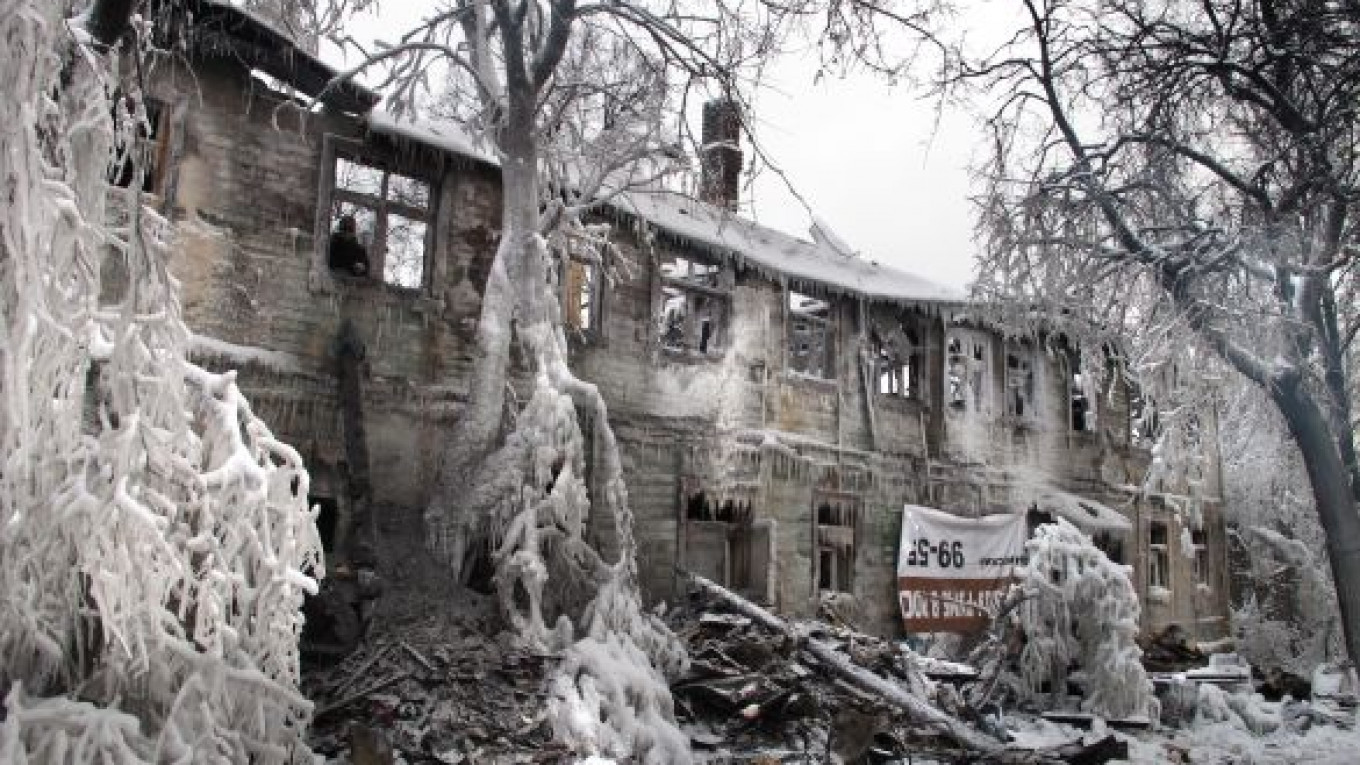The last remaining wooden dacha in the historic Tsaritsyno neighborhood was gutted by a fire close to two weeks ago, but fine, white flakes of ash still mix with the snowflakes that billow around its blackened frame. A smell of charred pine hangs in the air.
The dacha housed a museum of artifacts that belonged to its previous occupants. A sturdy typewriter, owned by the dacha’s first occupant, Sergei Muromtsev (1850-1910), who oversaw the enactment of the first Russian constitution as chairman of the first State Duma, was salvaged from the blaze. Also recovered were some heavy tomes that might have graced the bookshelf of poet and Nobel laureate Ivan Bunin (1870-1953), who met his future wife in a garden lane nearby.
But countless sketches and diaries by the artists who lived in the house since its construction toward the end of the 19th century — as well as the almost completely new building built in the 1930s — were destroyed by the blaze. One of its 25 or so permanent residents and embattled custodians, physics Ph.D. candidate Kirill Boldyrev, 24, seemed less fazed by the loss of his research materials than by the destruction of the historical legacy.
In the early hours of Jan. 3, the few residents remaining in one of the dacha’s flats during the holidays noticed smoke coming from another, unoccupied, flat. They immediately notified the fire department and struggled in vain to control the blaze themselves with an ice-clogged hose.
The firefighters refused to tackle the blaze when they arrived, Boldyrev said, and instead, pilfered memorabilia from the house. Apparently under orders from their superiors, they only began dousing the flames when they were already beyond control, and the dacha’s occupants were left on their own to extinguish small fires that burst sporadically from the smoldering ashes. One inspector at the scene told the occupants, off the record, that the blaze had all the signs of a deliberate attack. An investigating police officer could not be reached for comment on the allegation.
“The fire broke out in an unoccupied apartment with no electricity connection. And the window had been opened. Who would open a window in January?” Boldyrev asked rhetorically.
Boldyrev told The Moscow Times last year that local police warned that if they didn’t move out, “the house might ‘accidentally’ burn down.” Local authorities have been trying to evict the residents for years, saying they want to build a car park in its place.
Perched on the edge of the stunning snow-quilted Tsaritsyno Park, it’s easy to understand the dacha’s role as a creative retreat for generations of artists and writers. And its potential real estate value, with a main highway flanking its entrance, is equally obvious.
It is the latest in a series of suspicious fires that have gutted prime realty locations in Old Moscow. A month previously, a listed building was gutted on Potapovsky Pereulok close to Chistiye Prudy, and just over a month before that, Dom Bykova, one of Moscow’s finest examples of Art Nouveau, was hit by a fire near Mayakovskaya metro station.
In some cases, hasty reconstructions, with added commercial value and scant regard for historical authenticity, have swiftly followed fires in the city. The most prominent example is the Central Manezh Exhibition Hall near Red Square, which was rebuilt in just thirteen months after a fire in 2004. The result was a liberal reinterpretation of the original plans, including the addition of an extra underground floor and a starkly different ceiling design.
Other buildings — like the private residence, in Kitai-Gorod, of neoclassical architect Matvei Kazakov, who built some of Moscow’s most impressive late 18th-century buildings including Petrovsky Palace — are awaiting demolition after having been damaged by successive fires and then neglected.
Over 20 years of lobbying the government to grant the Tsaritsyno dacha protected status and to officially register its occupants seemed on the cusp of bearing fruit when the fire broke out, writer and campaigner Rustam Rakhmatullin said. A hearing in the Supreme Court to consider the status of its residents was scheduled for Jan. 20, and last year a renewed application to have the building listed was filed; no demolition or construction work is allowed while applications are under review.
On Jan. 11, the Communist Party in the Moscow City Duma demanded an investigation into the dacha fire and called for tougher measures to protect the city’s architecture.
A Message from The Moscow Times:
Dear readers,
We are facing unprecedented challenges. Russia's Prosecutor General's Office has designated The Moscow Times as an "undesirable" organization, criminalizing our work and putting our staff at risk of prosecution. This follows our earlier unjust labeling as a "foreign agent."
These actions are direct attempts to silence independent journalism in Russia. The authorities claim our work "discredits the decisions of the Russian leadership." We see things differently: we strive to provide accurate, unbiased reporting on Russia.
We, the journalists of The Moscow Times, refuse to be silenced. But to continue our work, we need your help.
Your support, no matter how small, makes a world of difference. If you can, please support us monthly starting from just $2. It's quick to set up, and every contribution makes a significant impact.
By supporting The Moscow Times, you're defending open, independent journalism in the face of repression. Thank you for standing with us.
Remind me later.


